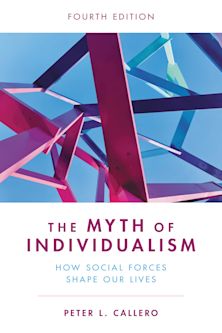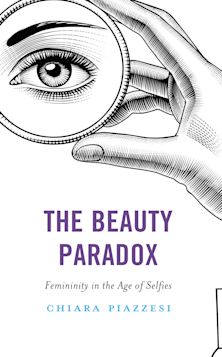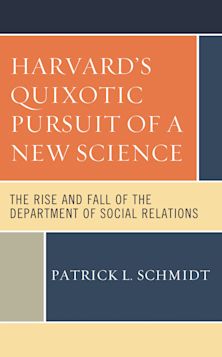- Home
- ACADEMIC
- Sociology
- Sociology - Other
- The Myth of Individualism
Inspection copy added to basket
This title is available for inspection copy requests
Choose your preferred format. EU customers: we regret we cannot currently supply print inspection copies via the website but ebooks are available.
Please note ebook inspection copies are fulfilled by VitalSource™.
Buy from Bloomsbury eTextBooks
You are now leaving the Bloomsbury Publishing website. Your eBook purchase will be with our partner https://www.vitalsource.com.
Your credit card statement will show this purchase originating from VitalSource Technologies. They will also provide any technical assistance you might require.
You must sign in to add this item to your wishlist. Please sign in or create an account
Description
The Myth of Individualism is a wonderful, concise introduction to sociology and sociological thinking, showing readers how social forces shape our lives and the world. Revised and updated throughout, the third edition of this powerful book continues to challenge the common belief that human behavior is the result of free choices made by autonomous actors, but rather shows the many ways that people are naturally social, interdependent, and shaped by social forces. Filled with engaging stories and deep research, The Myth of Individualism helps readers begin to develop a sociological imagination. By acknowledging the limits of individual effort and control, we gain insight into our own lives and the lives of others.
The third edition maintains the overall structure of the second edition while adding a new chapter on the power of the state that outlines the myriad ways—both seen and unseen—that government shapes our lives. The new edition also features more material on social media, updated discussions of race, and more. The book examines the importance of cultural symbols, the pressures of group conformity, the influence of family, the impact of social class, the reach of global capitalism, and the revolutionary potential of collective action. The third edition of The Myth of Individualism is a must-read for anyone interested in understanding the subtle and unshakeable ways social forces shape our lives.
Table of Contents
2 Becoming a Person: The Power of Symbols
3 Conformity and Disobedience: The Power of the Group
4 Family Matters: The Power of Social Class
5 Globalization: The Power of Capitalism
6 Government Control: The Power of the State
7 Violence, Sex, and Politics: The Power of Mass Media
8 From “Me” to “We”: The Power of Collective Action
Product details
| Published | 01 Aug 2017 |
|---|---|
| Format | Ebook (PDF) |
| Edition | 3rd |
| Extent | 248 |
| ISBN | 9798881853099 |
| Imprint | Rowman & Littlefield Publishers |
| Publisher | Bloomsbury Publishing |
About the contributors
Reviews
-
Peter Callero has scored again with the third edition of The Myth of Individualism. As before, this text is highly recommended as a supplement to an introductory text in sociology. Callero has produced an extremely readable overview of some difficult theoretical and conceptual problematics in sociology. He is able to integrate issues of micro and macro sociology using excellent concrete examples. A complementary and dialectical relationship between symbolic interactionism and basic structuralism is accomplished that is comprehensible to undergraduate students. The dialectic is demonstrated in a way that is clearly critical and even counter-hegemonic. This text is a true pleasure to read.
Dean Braa, Western Oregon University
-
Peter Callero's The Myth of Individualism is the kind of introductory sociology text that is needed to reach the millennium generation of students flooding into our colleges and universities. Current freshmen do not accept something as 'true' just because someone in authority tells them to think that way; they want to understand 'why' things are the way that they are and believe that they can impact pressing social issues. Instead of the 'time-tested' approach of many intro sociology textbooks—i.e. cataloging the social institutions and processes—Callero invites students to actively engage in sociological thinking by focusing on how our society's blind acceptance of the logic of individualism masks individuals' understanding the relationship between our personal lives and the social forces that structure them. With examples taken from current events, The Myth of Individualism will inspire students to reject reductionist explanations for social outcomes (e.g. the rich are rich because they work harder than other people), and to utilize a sociological perspective in responding to the issues they encounter in everyday life in a complicated world.
Peter Collier, Portland State University
-
Peter Callero, with head and heart, knows of what he writes, for he combines powerful narrative, praxis, and vision. One would expect no less from a scholar of society who has dedicated his life to seeking both truth and social justice. Such is a dialectic we all need to practice. And in the spirit of seeking truth and a better world, readers of this fine book can engage in a constructive debate with the author: is individualism a myth (in the pejorative sense) or is it an imaginative personal growth opportunity to go deep into one's spiritual and existential solitude (like Thoreau, for instance) and discover a profound social—and ecological—solidarity? Callero engages us if we decide to think with our whole beings as we read, in the best Socratic and Gandhian satyagraha traditions.
Frank Fromherz, Portland State University
-
In The Sociological Imagination, C. Wright Mills tells us that sociology promises an understanding of the connections between biography and history, self and society. In The Myth of Individualism, Peter Callero delivers on this promise. By showing how to think about ourselves as both products of society and its makers, Callero nurtures the sociological imagination while also helping us see what it means for creating a more just world.
Michael Schwalbe, North Carolina State University
-
The Myth of Individualism has exceeded all of my expectations. I use it every semester, and many students over the last few years have told me that this was the most interesting book they have ever read. It is a remarkably well-written book and very profound.
Benjamin Gross, St. Bonaventure University
-
I have used this book since it was published, and it is my favorite sociology book. The content is very accessible to all students—it is concise and affordable. Students can relate to the various stories very well and connect the concepts to their own lives.
Paul Harasha, Mesa Community College



































